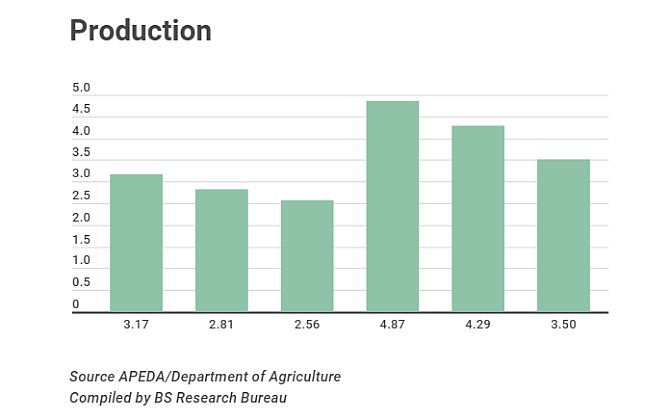At an average national price of Rs 90 a kg in the retail market, it shows a jump by 20% in the last two months.
Dilip Kumar Jha reports.

With its price shot up sharply in the last few weeks, tur dal has started slipping out of consumers's plate steadily.
Data compiled by the Union ministry of food, consumer affairs and public distribution showed the maximum tur dal prices across the country is at Rs 110 a kg on higher side and average or model price works out to Rs 90 a kg as on June 14, 2019.
In south Indian markets also, tur dal is trading at above Rs 100 a kg.
At an average national price of Rs 90 a kg in the retail market, it shows a jump by 20% in the last two months.
"There has been a shortage of tur availability in the market due to lower output last year and higher procurement by government agencies including Nafed," says SP Goenka, director, U Goenka and Sons, a pulses importer and trader.
"But the price increase is temporary. With the government being pro-active this time, tur dal prices are unlikely to move further up from this level," Goenka adds.
Along with tur dal, the whole grain (tur) price has also shot up steadily to trade at above the threshold of minimum support price of Rs 58.50 a kg.
Prices of tur and tur dal have remained subdued and many times below MSP for nearly two years due to higher supply.
Through the second advanced estimates, the Union ministry of agriculture has forecast India's total tur output at 3.68 million tonnes for 2018-2019 compared to 4.02 million tonnes of its production reported last year and 4.87 million tonnes in the previous year.
Its production was impacted badly in the drought-hit states like Maharashtra, Gujarat, Telangana, Tamil Nadu etc where rainfall was reported deficient in the monsoon season 2018.

Now, with the rainfall estimated to remain normal this year, tur output may jump in its major growing states including Maharashtra and Gujarat.
"Consumers need not worry as tur dal forms a very small portion of overall kitchen budget. Even an increase of Rs 30 to Rs 40 a kg in tur dal prices, the overall kitchen budget would not rise even a rupee per day in the family of four," says Bimal Kothari, managing director, Pancham International, a leading pulses importer and distributor in India.
Meanwhile, steady increase in tur dal price has raised several eyebrows in the government with traders seeking release of around 1 million tonnes held with the National Agricultural Cooperative Marketing Federation of India.
While the Government of India has already signed a bilateral agreement with Mozambique to import 175,000 tonnes of tur annually, its import has been facility further to ease supply tightness.
The government has already issued tenders to import around 200,000 tonnes of overall tur in coming months for which formalities have been worked out.
This means import would start soon.
Additionally, the government has also directed Nafed to release 200,000 tonnes of tur in the market to ease out supply pressure, said the source.
India imported around 0.5 million tonnes of tur dal in the financial year 2018-2019 as compared to 0.4 million tonnes and 0.7 million tonnes in the FY 2017-2018 and FY 2016-2017 respectively.
This year also, India's overall tur dal import is estimated at 0.5 million tonnes.


Source: Department of consumers affairs










 © 2025 Rediff.com -
© 2025 Rediff.com -